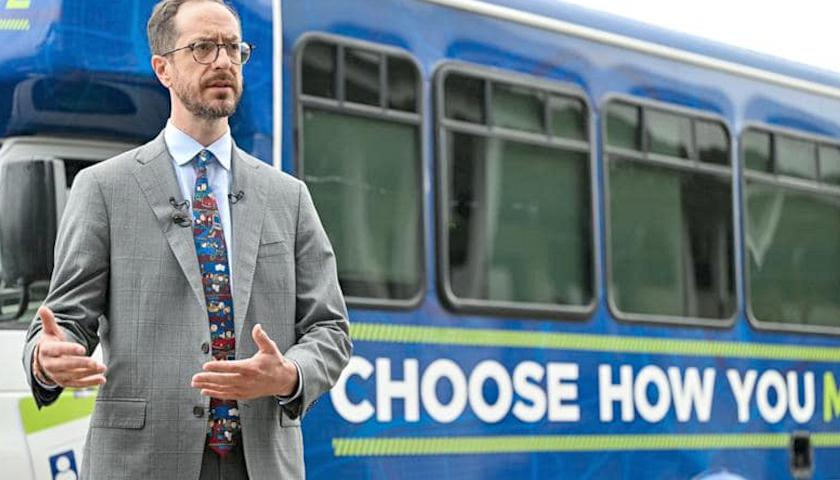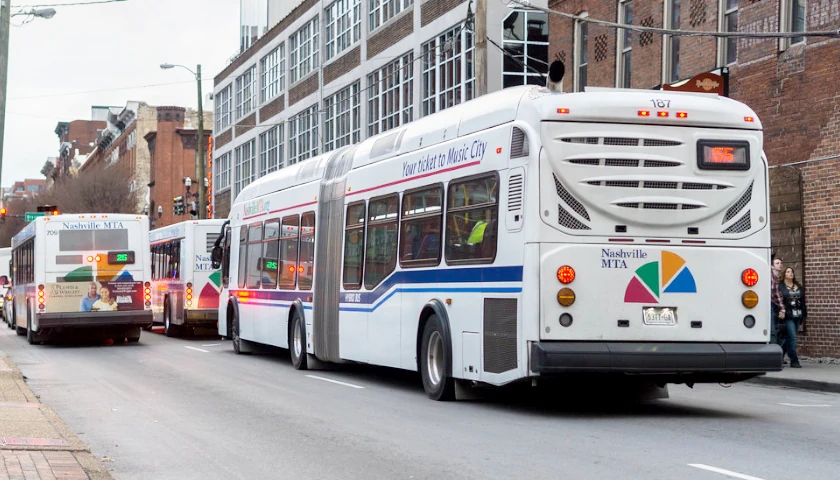The Davidson County Election Commission gave final approval to Nashville Mayor Freddie O’Connell’s multi-billion dollar transit plan on Thursday, marking the final step before the plan is presented to voters on the November 5 general election ballot.
O’Connell’s transit plan, “Choose How You Move: An All-Access Pass to Sidewalks, Signals, Service, and Safety,” would be funded by a half-cent increase in the city’s sales tax to construct miles of new sidewalks, bus stops, transit centers, parking facilities, and upgraded traffic signals throughout Nashville.
The Metro Nashville Council unanimously approved the mayor’s transit plan last month.
On the November 5 ballot, voters will see the following language describing the transit plan and its financing:
Passage of this measure adopted by Ordinance BL2024-427, allows the Metropolitan Government to complete the entire priority sidewalk network when combined with annual capital spending, provide significantly expanded 24-hour public transportation service 365 days a year including frequent service on major routes, add more neighborhood transit centers, improve safety for all roadway users, and upgrade and modernize nearly two-thirds of the city’s signalized intersections.
This program’s capital cost is estimated to have a current cost of $3,096,000,000. Once construction is complete, the estimated value of recurring annual operating and maintenance costs is approximately $111,000,000. The Metropolitan Transit Authority (WeGo), Nashville Department of Transportation and Multimodal Infrastructure, Metro Planning Department, and Mayor’s Office, in partnership with other Metro departments, will undertake implementation of the program.
This program will be funded by federal grants, revenues from transportation system fares, debt, and a sales tax surcharge of 0.5%. The tax surcharge will end once all debt issued for the transit improvement program has been paid and the Metropolitan Council determines by resolution that the revenues from the tax surcharges are no longer needed for operation of the program.
FOR or AGAINST
The highlights of O’Connell’s plan include 86 miles of sidewalk improvements, 54 miles of upgraded corridors, new 24/7/365 WeGo bus routes, 12 community transit centers, 17 new park and ride facilities, 35 miles of upgraded and new bicycle facilities, and traffic signals upgrades.
O’Connell concurred that the upgraded traffic signals are the aspect of his plan that “might help Nashvillians the most,” which critics have viewed as the mayor’s way to “buy” votes in November to help push his plan over the finish line.
Ben Cunningham, founder of the Nashville Tea Party, is among those critics.
Cunningham recently told The Tennessee Star’s CEO and Editor-in-Chief Michael Patrick Leahy that O’Connell’s addition of traffic signal improvements in his mass transit plan could be described as “adding ornaments on a Christmas tree,” which, as Cunningham has consistently pointed out, appears to be illegal under the IMPROVE Act.
The IMPROVE Act passed the Tennessee General Assembly in 2017 and permitted local governments to seek a dedicated funding source via surcharge to support mass transportation projects through a local referendum.
While the mayor’s vision to expand the city’s public bus services and upgrade public mass transit facilities would fall in line with the IMPROVE Act, Cunningham said O’Connell’s additional proposals included in his plan – including traffic lights, sidewalks, and the purchase of property for “affordable housing” – are not permitted under the 2017 law.
Cunningham said such additional improvements should be a part of the city’s normal operating budget.
“The only mass transit system we’ve got in Nashville is this awful bus system, the WeGo bus system, that carries less than 1 percent of commuters. It’s slow, it’s a fixed route, and 99.5 percent choose not to use it. But it’s the only thing [O’Connell] could fund according to the IMPROVE Act and he knew that wouldn’t pass, so he had to add all these other elements onto it – sidewalks and traffic light enhancements, bicycle improvements, land purchasing for affordable housing. The problem, of course, is that none of that is authorized under the IMPROVE Act,” Cunningham explained on a recent episode of The Michael Patrick Leahy Show.
“It’s just purely illegal,” Cunningham added at the time.
Cunningham has also raised concerns about other aspects of the mayor’s plan, including crime, additional costs, and outdated technology.
– – –
Kaitlin Housler is a reporter at The Tennessee Star and The Star News Network. Follow Kaitlin on X / Twitter.
Photo “Mayor Freddie O’Connell” by Mayor Freddie O’Connell.






This will be a financial disaster for Nashville. The actual cost is $6 billion and $3 Billion is “unfunded”. Anyone earning less than $48,000 a year will ride Free – that includes all the Homeless. The Homeless will stay on the buses a lot, and who can blame them, but other people won’t ride with them. So, the actual Fare Revenues will drop 90% from where they are.
The Leftists say “It doesn’t matter how much money it loses because it’s an Essential Service, like the police.” I’m not making that up.
Absolutely amazing how wording can be twisted and obfuscated to make black sound white and reckless spending sound like good business sense.
Freddie the Freeloader should be ridden out of town on a rail.
They cannot even add speed tables on side streets without messing things up. Now they want to spend billions on a fantasy plan that will be full of cost over runs.
Where do I get a Vote No sign for this plan
“Choose How You Move” when fleeing Nashville’s crime.